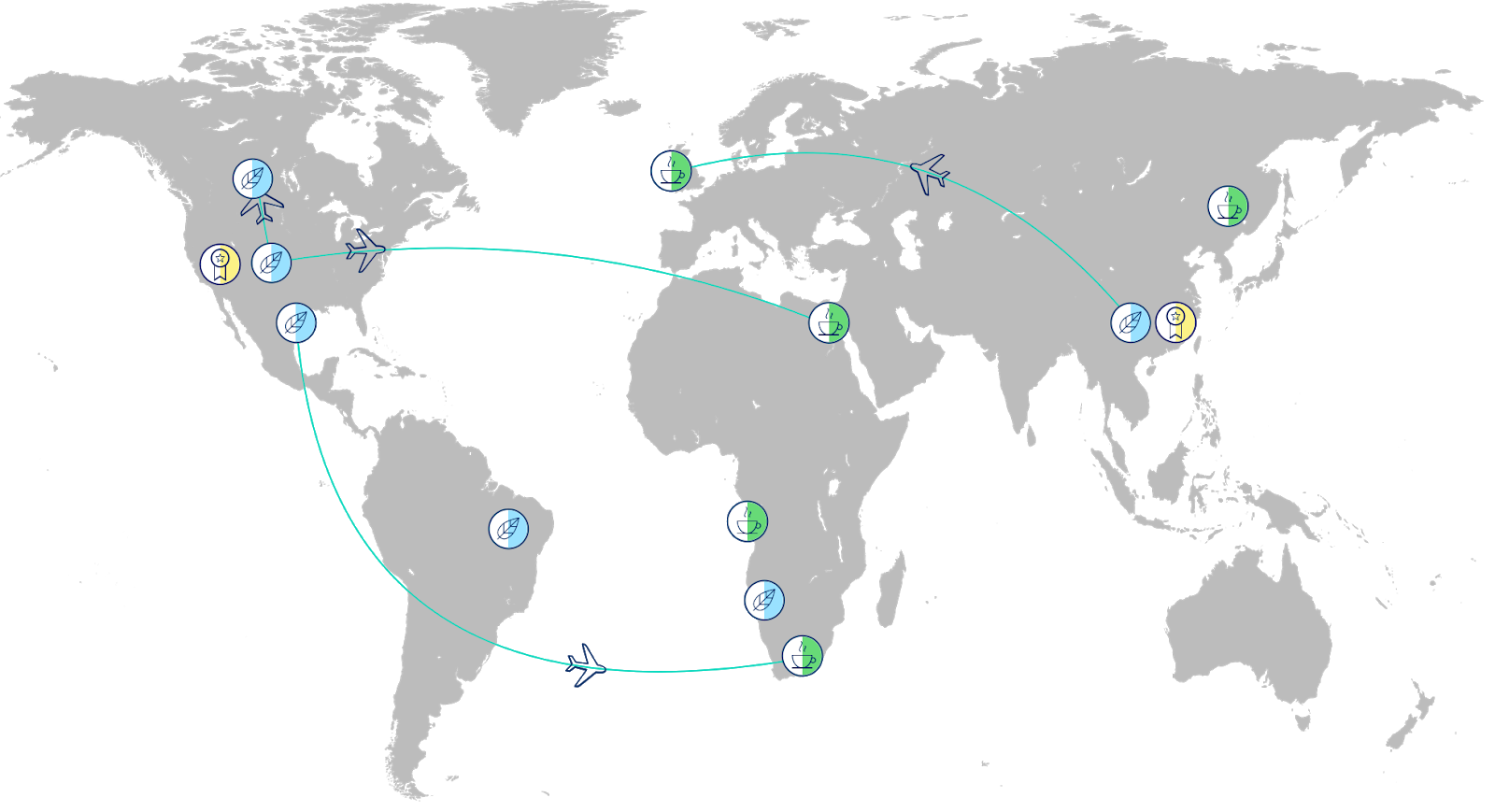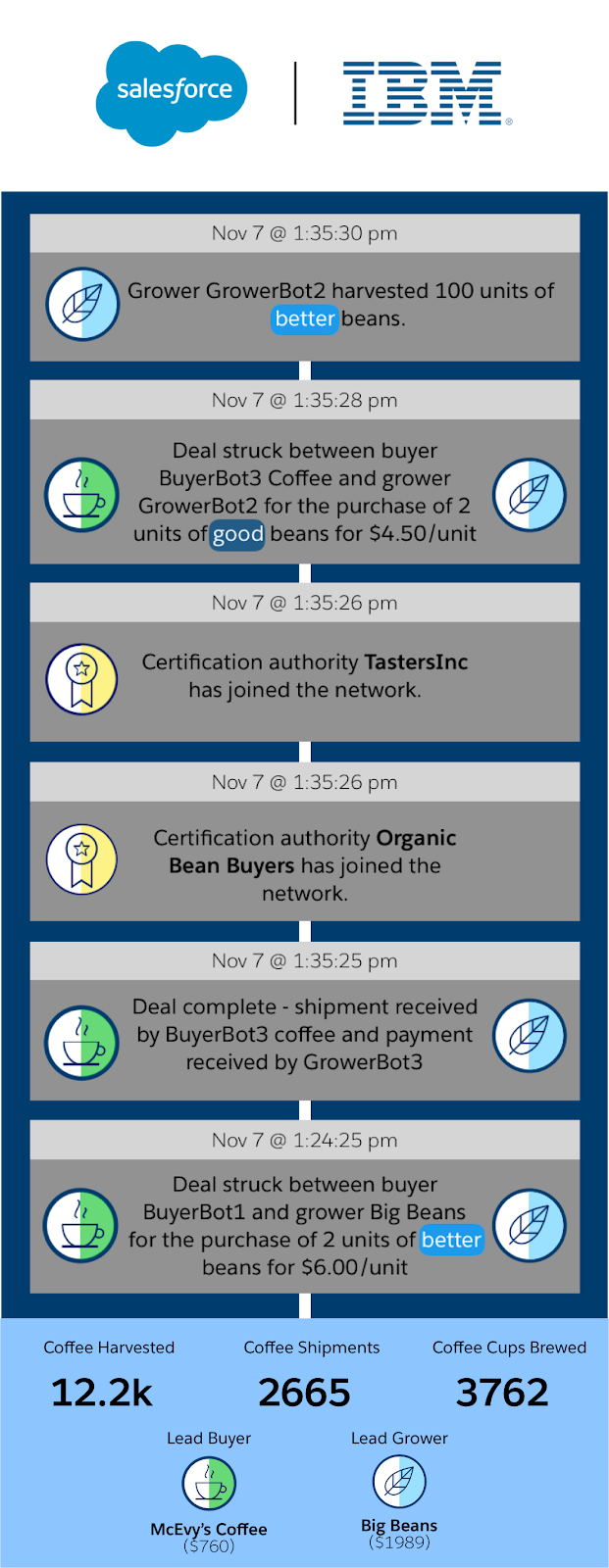See Blockchain in Action
Learning Objectives
After completing this unit, you’ll be able to:
- Explain how an ecosystem works on a blockchain.
- Explain how smart contracts work.
- Describe a tangible use case.
Let’s walk through a use case and see blockchain in action!
The Coffee Bean Business Network
The business network for buying and selling coffee beans is definitely a global one, consisting of many participants:

- Coffee bean growers who make money by selling the beans they harvest.
- Coffee bean brewers who buy the coffee beans and make money by turning them into heart-warming cups of coffee for their customers.
- Logistic and shipping companies that pick up the coffee from growers and deliver them to brewers around the world.
Let's say you’re a coffee brewer, McEvy’s Coffee. You start out with a small inventory of three kinds of coffee beans: Good, Better, and Best. As a brewer, you make money by converting the beans into cups of delicious coffee and selling them to your customers.
Your efficiency and the quality of coffee beans you use determine how much profit you make.
After you brew coffee and make a profit, you find you've used up all your Best beans. You definitely need more—you make more money per cup of Best coffee than you do from other types. But first, you need to find a coffee bean supplier.

In a world without blockchain, you find it difficult to even find a coffee bean grower who is willing to sell you the quality of beans you need with terms that work for you. Even after you find one, you still need to negotiate the price and the quantity. Then the grower might promise to give you their Best quality coffee beans, but you have no guarantee.
Smart Contracts
This is where blockchain comes in. Blockchain improves the efficiency between brewer and grower during the contracting process.
Blockchain lets you and the grower use a smart contract that codifies the terms and conditions that you agree to use to trade coffee beans.
So, using a mobile app, you request to use a smart contract to buy coffee beans. You set up the terms:
- The quality of beans you want to buy—Best
- The quantity you want to buy—40 units
- The price range you're willing to accept—anywhere up to $7 per unit
When you submit your smart contract, it's registered in the network and the blockchain logic matches you with a grower who accepts your terms and conditions.
The smart contract increases the level of trust between participants because it's the only mechanism that allows organizations to participate in the coffee bean network. No one organization has the ability to change the business rules that have been set up.
If you want to withdraw at any time because you have enough Best quality coffee beans, you can do that. Otherwise, smart contracts in this particular network are designed to keep looking for matches for you.
Provenance
 With blockchain, you can trace the history of the coffee beans and have a guarantee of quality. For example, with your transaction, the shared ledger records: "Deal struck between buyer McEvy’s Coffee and grower Big Beans for the purchase of 40
units of Best beans for $6.00/unit."
With blockchain, you can trace the history of the coffee beans and have a guarantee of quality. For example, with your transaction, the shared ledger records: "Deal struck between buyer McEvy’s Coffee and grower Big Beans for the purchase of 40
units of Best beans for $6.00/unit."
It's important to understand that this level of visibility would go up to a global coffee regulator. Organizations performing regulatory roles such as this often require a certain amount of insight to make sure that everyone is following the rules.
Without blockchain, that regulator would need to collect the activity reports from all the participants and do forensic analysis to untangle the spaghetti mess of transactions that took place, hoping they could figure out if someone was trying to hide something to make themselves look better (or become richer).
But in this case, consensus builds around every single record on the ledger. Everyone in the business network knows they can trust the information. And the regulator can rely on it to provide visibility into the state of the business network.
Privacy
Now, it's obvious this information is highly sensitive–how much coffee is bought, prices, quantities, and so on. You definitely want to keep your deal information away from competitors.
Luckily, when you joined this network, you went through an on-boarding process which included terms and conditions you had to agree to and a review conducted by other members. Once you were accepted, you were given a digital identity and a set of digital keys that you could use to decrypt and look at certain data fields inside the shared ledger.
Each buyer and seller on the network has visibility into only the transactions they are involved with. By design, the business blockchain prevents them from gaining unauthorized access to others' sensitive information.
Every time you brew coffee, it shows up here. You’re able to trace the history back to see the quality of the coffee sent to you, and when the grower harvested it. And that’s it.
New Business Models

Blockchain enables you to do things you couldn't do before with traditional ledgers.
Let's take a look at certification organizations, whose job it is to analyze business practices and give their coffee seal of approval if growers or buyers meet their standards.
The ledger starts showing new entries from these certification organizations. For example, "Certification authority Organic Bean Buyers has joined the network," and "Taster's Inc. has joined the network." This information is available and visible to others on the network.
On the growers' side, an environmental organization or a fair trade practices organization might review the grower’s environmental practices. Now, the grower can apply for certification on the blockchain and, if successful, can attract more buyers to do business with them, since their certification is visible to the network . Buyers can see that a respected authority has stamped the ledger with their seal of approval in a way that is tamper-proof and trusted.
On the buyer’s side, where they are converting coffee beans into cups of delicious, hot coffee, certification comes from a food critic. Having critical acclaim might add to the selling price of your coffee. And since the critic is trusted with their work fully tracked on the ledger, you can claim the title of having the Best Cup of Coffee in the area without question.
Start a Blockchain Network
Now that you understand the value of a business network based on blockchain, you might see opportunities for your business. Maybe you know of a new blockchain network forming in your industry. Or there’s an opportunity for you to gather a few other organizations together and establish a new business blockchain network yourself.
Being a network founder can have many benefits, since you get a say in who gets to join and what criteria they need to meet. But with that power comes responsibility—blockchain networks are only successful when others want to join. In other words, you need to give them clear incentives and ensure that they get some benefit from participating.
Blockchain is all about helping business networks reduce risk while increasing trust and security. It can provide transparency to the regulators and other participants who need it, while still providing the privacy and the specific views into the ledger that are relevant for each of the different types of participants. Businesses benefit. Your customers benefit.
